动词的主动形式表示被动之意(附练习及答案)
动名词主动表被动的三种类型
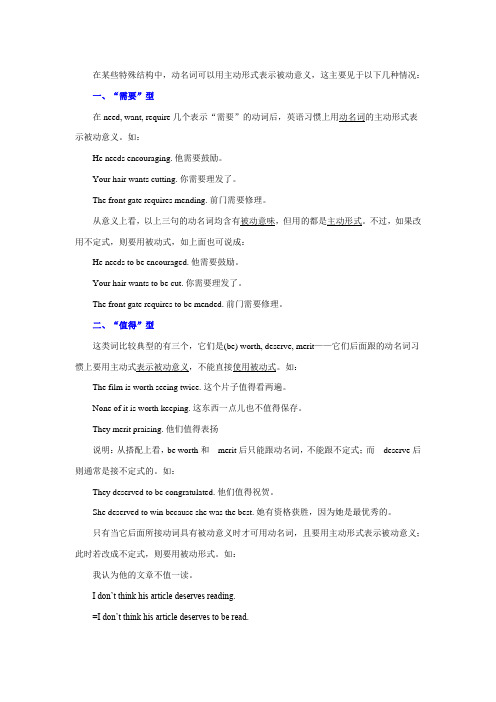
在某些特殊结构中,动名词可以用主动形式表示被动意义,这主要见于以下几种情况:一、“需要”型在need, want, require几个表示“需要”的动词后,英语习惯上用动名词的主动形式表示被动意义。
如:He needs encouraging. 他需要鼓励。
Your hair wants cutting. 你需要理发了。
The front gate requires mending. 前门需要修理。
从意义上看,以上三句的动名词均含有被动意味,但用的都是主动形式。
不过,如果改用不定式,则要用被动式,如上面也可说成:He needs to be encouraged. 他需要鼓励。
Your hair wants to be cut. 你需要理发了。
The front gate requires to be mended. 前门需要修理。
二、“值得”型这类词比较典型的有三个,它们是(be) worth, deserve, merit——它们后面跟的动名词习惯上要用主动式表示被动意义,不能直接使用被动式。
如:The film is worth seeing twice. 这个片子值得看两遍。
None of it is worth keeping. 这东西一点儿也不值得保存。
They merit praising. 他们值得表扬说明:从搭配上看,be worth 和merit 后只能跟动名词,不能跟不定式;而deserve 后则通常是接不定式的。
如:They deserved to be congratulated. 他们值得祝贺。
She deserved to win because she was the best. 她有资格获胜,因为她是最优秀的。
只有当它后面所接动词具有被动意义时才可用动名词,且要用主动形式表示被动意义;此时若改成不定式,则要用被动形式。
如:我认为他的文章不值一读。
I don’t think his article deserves reading.=I don’t think his article deserves to be read.三、“超越”型这类介词主要有past, beyond 等,它们均表示“超越”“在……之外”,它们后接动名词通常用主动形式表示被意义。
英语主动表被动用法归纳
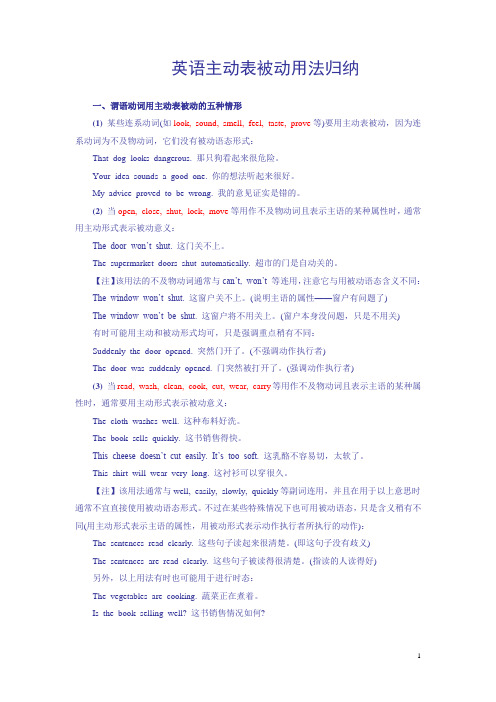
英语主动表被动用法归纳一、谓语动词用主动表被动的五种情形(1)某些连系动词(如look, sound, smell, feel, taste, prove等)要用主动表被动,因为连系动词为不及物动词,它们没有被动语态形式:That dog looks dangerous. 那只狗看起来很危险。
Your idea sounds a good one. 你的想法听起来很好。
My advice proved to be wrong. 我的意见证实是错的。
(2)当open, close, shut, lock, move等用作不及物动词且表示主语的某种属性时,通常用主动形式表示被动意义:The door won’t shut. 这门关不上。
The supermarket doors shut automatically. 超市的门是自动关的。
【注】该用法的不及物动词通常与can’t, won’t 等连用,注意它与用被动语态含义不同:The window won’t shut. 这窗户关不上。
(说明主语的属性——窗户有问题了)The window won’t be shut. 这窗户将不用关上。
(窗户本身没问题,只是不用关)有时可能用主动和被动形式均可,只是强调重点稍有不同:Suddenly the door opened. 突然门开了。
(不强调动作执行者)The door was suddenly opened. 门突然被打开了。
(强调动作执行者)(3)当read, wash, clean, cook, cut, wear, carry等用作不及物动词且表示主语的某种属性时,通常要用主动形式表示被动意义:The cloth washes well. 这种布料好洗。
The book sells quickly. 这书销售得快。
This cheese doesn’t cut easily. It’s too soft. 这乳酪不容易切,太软了。
主动语态表被动意义
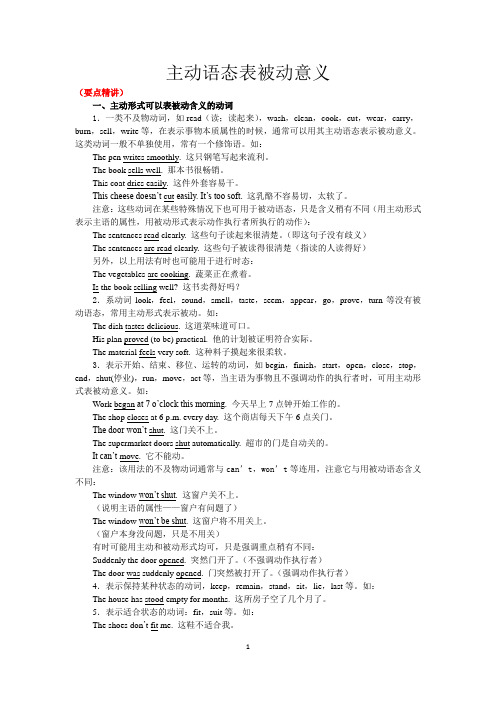
主动语态表被动意义(要点精讲)一、主动形式可以表被动含义的动词1.一类不及物动词,如read(读;读起来),wash,clean,cook,cut,wear,carry,burn,sell,write等,在表示事物本质属性的时候,通常可以用其主动语态表示被动意义。
这类动词一般不单独使用,常有一个修饰语。
如:The pen writes smoothly. 这只钢笔写起来流利。
The book sells well. 那本书很畅销。
This coat dries easily. 这件外套容易干。
This cheese doesn’t cut easily. It’s too soft. 这乳酪不容易切,太软了。
注意:这些动词在某些特殊情况下也可用于被动语态,只是含义稍有不同(用主动形式表示主语的属性,用被动形式表示动作执行者所执行的动作):The sentences read clearly. 这些句子读起来很清楚。
(即这句子没有歧义)The sentences are read clearly. 这些句子被读得很清楚(指读的人读得好)另外,以上用法有时也可能用于进行时态:The vegetables are cooking. 蔬菜正在煮着。
Is the book selling well? 这书卖得好吗?2.系动词look,feel,sound,smell,taste,seem,appear,go,prove,turn等没有被动语态,常用主动形式表示被动。
如:The dish tastes delicious. 这道菜味道可口。
His plan proved (to be) practical. 他的计划被证明符合实际。
The material feels very soft. 这种料子摸起来很柔软。
3.表示开始、结束、移位、运转的动词,如begin,finish,start,open,close,stop,end,shut(停业),run,move,act等,当主语为事物且不强调动作的执行者时,可用主动形式表被动意义。
被动语态中主动形式表示被动意义讲解及练习教师版
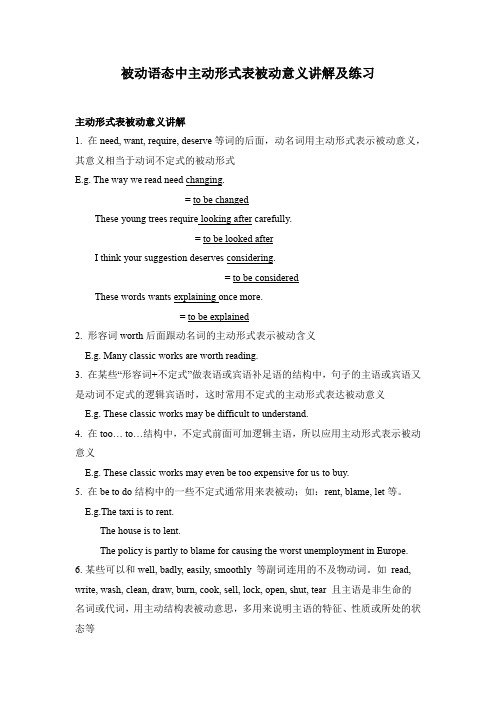
被动语态中主动形式表被动意义讲解及练习主动形式表被动意义讲解1. 在need, want, require, deserve等词的后面,动名词用主动形式表示被动意义,其意义相当于动词不定式的被动形式E.g. The way we read need changing.= to be changedThese young trees require looking after carefully.= to be looked afterI think your suggestion deserves considering.= to be consideredThese words wants explaining once more.= to be explained2. 形容词worth后面跟动名词的主动形式表示被动含义E.g. Many classic works are worth reading.3. 在某些“形容词+不定式”做表语或宾语补足语的结构中,句子的主语或宾语又是动词不定式的逻辑宾语时,这时常用不定式的主动形式表达被动意义E.g. These classic works may be difficult to understand.4. 在too… to…结构中,不定式前面可加逻辑主语,所以应用主动形式表示被动意义E.g. These classic works may even be too expensive for us to buy.5. 在be to do结构中的一些不定式通常用来表被动;如:rent, blame, let等。
E.g.The taxi is to rent.The house is to lent.The policy is partly to blame for causing the worst unemployment in Europe. 6.某些可以和well, badly, easily, smoothly 等副词连用的不及物动词。
todo主动表示被动
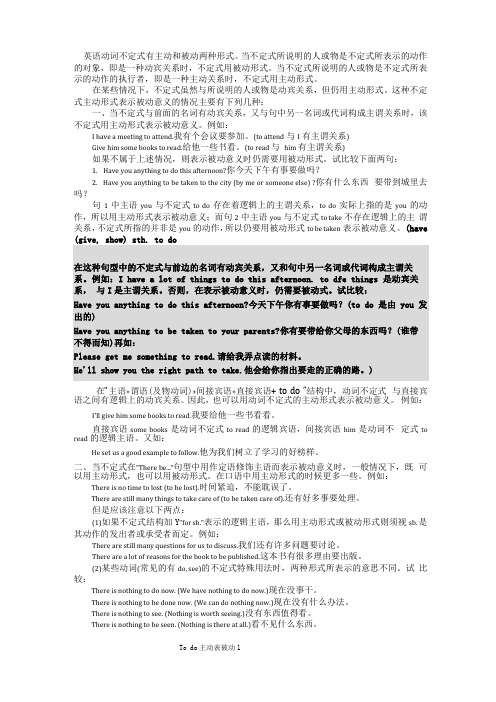
英语动词不定式有主动和被动两种形式。
当不定式所说明的人或物是不定式所表示的动作的对象,即是一种动宾关系时,不定式用被动形式。
当不定式所说明的人或物是不定式所表示的动作的执行者,即是一种主动关系时,不定式用主动形式。
在某些情况下,不定式虽然与所说明的人或物是动宾关系,但仍用主动形式。
这种不定式主动形式表示被动意义的情况主要有下列几种:一、当不定式与前面的名词有动宾关系,又与句中另一名词或代词构成主谓关系时,该不定式用主动形式表示被动意义。
例如:I have a meeting to attend.我有个会议要参加。
(to attend与I有主谓关系)Give him some books to read.给他一些书看。
(to read 与him 有主谓关系)如果不属于上述情况,则表示被动意义时仍需要用被动形式。
试比较下面两句:1.Have you anything to do this afternoon?你今天下午有事要做吗?2.Have you anything to be taken to the city (by me or someone else) ?你有什么东西要带到城里去吗?句1中主语you与不定式to do存在着逻辑上的主谓关系,to do实际上指的是you的动作,所以用主动形式表示被动意义;而句2中主语you与不定式to take不存在逻辑上的主谓关系,不定式所指的并非是you的动作,所以仍要用被动形式to be taken表示被动意义。
(have在“主语+谓语(及物动词)+间接宾语+直接宾语+ to do ”结构中,动词不定式与直接宾语之间有逻辑上的动宾关系。
因此,也可以用动词不定式的主动形式表示被动意义。
例如:I'll give him some books to read.我要给他一些书看看。
直接宾语some books是动词不定式to read的逻辑宾语,间接宾语him是动词不定式to read的逻辑主语。
主动语态表被动

【注】①这类结构的特点是句子主语就是其后不定 式的逻辑宾语,按理说其中的不定式要用被动形式, 但习惯上却要用主动表被动。这类形容词常见的有 awkward, convenient, dangerous, difficult, easy, hard, impossible, interesting, nice, pleasant, safe, tough, tricky, unpleasant 等。
(3) 不定式用于某些动词(如have, have got, get, want, need等)的宾语后作定语时,如果不定式的逻 辑主语就是句子的主语,则要用主动形式表示被动 意义: I have some letters to write. 我有一些信要写。 I want something to drink. 我想喝点什么。 I want to get something to read. 我想找点东西阅读。 【注】如果不定式的逻辑主语不是句子的主语,则 应用被动式,比较: I have something to type. 我有些东西要打(字)。(指 自己打字) I have something to be typed. 我有些东西要打(字)。 (指请人打字)
2.不定式 1)作定语:不定式结构常表示动宾关系,即用不定式的主动形 式表示被动意义。 这种情形最常出现在(1)“There+be+主语+修饰主语的不定 式”: There is a lot of work to do. 有许多工作要干。 和(2)“及物动词+宾语(或双宾语)+修饰宾语的不定式”结 构中: Give him some books to read. 给他点书看 特别是(3)“主语+have+宾语+修饰宾语的不定式”结构中, 例如: He has a family to support. 他要维持一个家庭。 当然,这里的不定式在个别情形下也可用被动形式,含义区别不 大,例如: There is so much work to do/to be done. 有这么多事情要做。 Give me the names of the people to contact/to be contacted. 把那些要联系的人的名字给我。
英语中的主动形式表被动意义
主动形式表被动意义一、介词形式,被动意义This new railway is still under construction. 这条新铁路仍在建设中。
本句中的under construction “正在建设中”。
介词under构成的短语,如果它的宾语是表示动作的名词,通常含有被动意义,意为“在……过程中”。
它可改换为被动语态。
但介词结构使句子言简意赅,避免过多地使用被动语态。
这种介词短语在句中常作表语,也可作补足语或定语。
例如:Your suggestion is still under discussion. 你的建议正在讨论中。
He is said to be under arrest for stealing. 据说他由于偷窃被捕了。
The house under repair is our classroom building. 正在修建的房屋是我们的教学楼。
常见的这类under短语还有:under attack在进攻中,under arrest在关押中,under consideration在考虑中,under construction 在建设中,under contact在联系中,under discussion在讨论中,under examination在审查中,under investigation在调查中,under repair在修理中,under review在审议中under treatment 在医治中,under trial在受审中还有一些介词,如in , on , for , above , beyond , past , out of , within等,也可以构成表示动作的介词短语。
如:The writer has finished writing his novel but it is not yet in print. (= …being printed)作者已经写完了他的小说,但尚未出版。
主动形式表被动含义
主动形式表被动含义1. f eel, taste, sound, smell, look等感官动词和keep, remain, stay, seem, appear, prove等表示状态的系动词后接形容词/名词/介词短语或“to be + 形容词(名词)”作表语时,这些动词常常以主动形式表示被动含义,此时句子的主语是被感知或描述的对象。
例如: Silk feels very soft. 丝绸摸上去很柔软What you said sounded a bit reasonable. 你说的听起来有点道理The little baby looks like a small cat. 这婴儿看上去像只小猫My room keeps clean all the time. 我的房间一直(被)保持得很干净Einstein’s theory later proved (to be) true. 爱因斯坦的理论后来(被)证明是正确的2. wash, write, wear, sell, read, dry, clean, run, open等动词作谓语时,常可用主动形式表示被动含义,注意:这类动词往往与easily, well, badly, smoothly等副词连用,表示主语的属性特征。
例如:This kind of cloth washes easily. 这种布很好洗。
Food of this kind sells well. 这种食品很好卖。
Nylon cleans easily 尼龙容易洗干净。
The coat dries easily 这种外衣容易干。
3. take place, happen, hang, measure, weigh等描述状态的不及物动词和短语动词可以用主动形式表示被动含义。
例如:Great changes have taken place in our school in the last 5 years.过去5年里我们学校发生了巨大的变化。
以主动形式表示被动之意的动词有什么
以主动形式表示被动之意的动词有什么?没有被动式的动词有什么?答:一、主动形式表示被动:1. lock, open, read, sell, teach, translate, wash, write等动词,用来说明主语的性质特征而不是强调被执行的动作时,用主动形式表达被动意义,且常与not, hardly, well, easily, badly, nicely 等副词连用。
例如:The poem translates well. 这首诗翻译得很好。
The cloth washes easily. 这种布料容易洗涤。
Bikes of that kind hardly sell. 那种自行车很难卖出。
2. weigh, measure, cost, last, break out, take place, happen表示“称重”、“测量”、“花费”、“持续”、“发生”等状态动词或不及物动词,虽然汉语有被动含义,但英语要用主动形式。
例如:The meeting lasted two hours. 会议持续了两小时。
What happened to him last night? 昨晚他发生了什么事?3. feel, look, sound, smell, taste等半系动词,用主动形式表达被动意义。
例如:The bamboo chair feels cool. 这竹椅摸起来很凉快。
His theory sounded reasonable. 他的理论听起来有些道理。
4. 表示“需要”的need, want, require等动词以及形容词worth(值得)后面,跟动词的ing 的主动形式表达被动意义。
例如:The old house wants repairing (or: to be repaired).那座旧房子需要修了。
This dictionary is well worth buying.这本字典很值得买。
主动形式表示被动意义的十二种情况
英语的被动意义除了用及物动词的被动语态形式表示外,还可以用其他方法来表示,就像在汉语中并非一定要用“被”字来表示的被动意义一样。
我们把这种用法称之为“主动表被动”,下面笔者就这种可以用主动形式表示被动意义的场合归纳如下。
1.用某些不及物动词表示被动意义,如:carry, cut, drive, iron, keep, lock, open, pick, read, shut, tear, wash, wear, write等等。
这类动词既能作及物动词,也能做不及物动词。
作不及物动词时,形式上虽为主动,却表示被动意义。
例如:Meat cuts easily.肉容易切。
His novel sells well.他的小说畅销。
The car drove easily.这车很容易开。
Your pen writes quite smoothly.你的笔写起来很滑。
2.某些表示感觉动词的动词可以用主动形式表示被动意义。
例如:This shirt feels much softer than that one.这件衬衫比那件衬衫摸起来柔软得多。
That book smells old.那本书有一股霉味。
These oranges taste nice.这些橙子味道很好。
3.有少数动词(bind, cook, do, owe, print)的进行时有时有被动意义。
在这种用法中,句子的主语都一般是指物的。
例如:The magazine is binding(printing).这本杂志正在装订(印刷)。
He paid all that was owing.欠的钱他都还了。
The meat is cooking.正在火敦肉。
4.动词get, come, go之后接过去分词,表示被动意义。
get的这种用法局限于口语和非正式的书面语言,更强调动作的结果而非动作本身,并常用来表示突发性的、出乎意料的偶然事件。
而come和go常接含否定意义的过去分词。
- 1、下载文档前请自行甄别文档内容的完整性,平台不提供额外的编辑、内容补充、找答案等附加服务。
- 2、"仅部分预览"的文档,不可在线预览部分如存在完整性等问题,可反馈申请退款(可完整预览的文档不适用该条件!)。
- 3、如文档侵犯您的权益,请联系客服反馈,我们会尽快为您处理(人工客服工作时间:9:00-18:30)。
动词的主动形式表示被动之意一、系动词无被动语态:以主动形式表示被动之意常见的系动词有:①be 动词②. 起来(7 个):look/seem/appear, feel(感觉,摸起来),sou nd, smell, tastee.g. She seems/appears happy. It smells terrible.③(逐渐)变得 /变成: become, grow, get, turn, come, goe.g. His wish has come true.People often went hungry in the old days.The tree is growing tall.④保持: keep, staye.g. We must keep quiet in the reading room.二、下列动词(词组)没有被动式:1、happen, take place, break out, belong to ,cost, take2、不及物动词 sell, wash, read , write, open, close, shut, lock, wear 等,常用主动形式表示被动意义。
Ol、An accident was happened yesterday. (x)昨天发生了一起事故。
An accident happened yesterday.O2、 The flower smells sweet. 这花闻起来很香。
O3、 The watch looks good. 这表看起来很好。
O4、 This book sells well. 这本书畅销。
O5、 The kind of cloth washes well. 这种布很容易洗。
O6、 The article reads well. 这篇文章读起来很好。
O7、 The supermarket opens at 8:00 in the morning. 超市在早上八点钟营业。
08、The door won ' t close/sh这门关不上。
O9、 The door locks easily. 这门容易锁。
O 10 This material wears well (won '这种ea料耐久(不耐久)三、Need, want, require (要求,需要),deserve(应得,值得),be worth 值得),not bear(经不住)后面接doing主动表被动。
The book is worth reading. 这本书值得一读。
The old buildi ng requires repairi ng. 这座古建筑需要修了。
These young seedli ngs will require/n eed look ing after (=n eed to be looked after) carefully. 这些幼苗将需要小心的照管。
Your hair wants/n eeds cutt ing (n eeds to be cut). 你的头发该剪了。
四、不定式作定语,放在被修饰词后面,与前面被修饰的名词或代词有动宾关系,又在句子中与另一名词或代词有主谓关系,不定式要用主动表被动含义。
I have much work to do. 我有许多要做的事情。
(与 work有动宾关系,与I有主谓关系)Tom is looking for a room to live in. Tom 在找一间住的房间。
(与 room 有动宾关系,与Tom有主谓关系)He has a family to support. 他要维持一个家庭。
(与family 有动宾关系,与he有主谓关系)五、不定式修饰作表语和宾语补足语的形容词时,结构:主语+系动词+形容词+不定式;动词+宾语+形容词+不定式。
如果形容词是表示难易、利弊等含义,如difficult, easy, comfortable(舒适的),convenient (便利的,方便的),hard,cheap, expe nsive, 等,不定式用主动表被动。
The question is difficult to an swer. 这个问题很难回答。
The work is easy to do. 这项工作很好做。
我觉得这种车很好坐。
I found the car comfortable to ride in.That makes poetry difficult to write. 那就使得诗很难写。
被动语态专项练习I 单项选择again and again.A. should be readedC. were set upprinting 500 copies by the end of last month.9. Rice ___ also ___ in their hometown.A. is …grownB. is … grewC. was …grewDwas …grown10. He ___ by the teachers.A. is always praisedB. praisesC. have been praisedD. always is praised11. Great changes ___ place. Many new schools ___ .A. have taken, have been openedB. take, are open D.have been taken, are opened1. Good booksB. should be readC. must readD. ought to read2. The childrenby the nurse.after3. HeA. were lookedB. looked afterC. were lookedD. lookedsome pieces of advice, but heto them.A. gave, didn't listen C. give, wasn't listened4. When ___ the accident ___B. was given, wasn't listened D. was given, didn't listen A. was, happenB. did, happenC. is, happen5. The question ___ by us soon.A. is going to discuss D. was, happenedB. will discussC. is going to be discussed 6. The lab _________ about five yearsago. D. has been discussedA. was buildedB. was builtC. buildsD. hasbeen built7. A lot of tall buildingsin his hometown in the last three years.A. have set upB. have been set up 8. TheyA. had finishedB. have finishedC. had been finishedD. have been finishedD. set upC. are taken, openA. was takingB. had been takenC. was takenD. had taken13. We can't use the bridge now, because it _ .A. has been repairedB. is repairingC. is repairedD. is being repaired14. I ___ the way to the railway station by a policeman.A. was shownB. showedC. have shownD. wasshowing15. The war______ in 1941.A. broke outB. had been broken outC. was broken outD. had broken out16. When water _______ , it will be changed into vapor(蒸汽).A. is heatedB. heatingC. has heatedD. heats17. We can't enter the room because its door __ .A. lockedB. locksC. is lockedD. is locking18. They _____ day and night.A. are made workB. are made to workC. made to be workedD. are making to work19. Chang'an Road is ____ of people.A. filledB. fillC. fullD. fulled20. Man-made satellites ___ into space by many countries.A. was sent upB. is sent upC. have been sent upD. has been sent up21. This English song ___ often ___ by the children.A. is, singingB. is, sungC. will, singD. was,sung22. ________________________ The windows of our house once a week.A. must cleanB. have cleanedC. is cleanedD.are cleaned23. When _____ the People's Republic of China__ ?A. was, foundB. was, foundedC. did, foundD.does, found24. Mary's radio ____ by my brother just now.D. mended25. Your exercise books ___ after class.A. will hand inB. must hand inC. handed inD. must be handed in26. Some trees may _____ at other times of the year.A. be plantedB. plantC. are plantedD. will be planted27. The sun ____ at night as usual. A. can be seenB. can't seeC. can't be seenD. doesn't seethere next week.B. will be put onD. will be putted on school yesterday. B. has been happened D. was going tohappen by little Tom this morning.B. is broken, was brokenD. has been broken, broken 1. I saw the boy run yesterday.2. He told me that he would come back soon.3. You can find a lot of differences between the two languages.4. Do you water your flowers every day?5. The wind blew down the big tree last night.6. I think that he is right.7. He had not thrown the bad food.8. Mother was not mending the trousers.9. They would not take him to Beijing. 10. Nobody knew me in this town at that time. 参考答案I 单项选择1. B2. C3. D4. B5. C6. B7. B8. A9. A 10. A 11. A 12. C 13. D 14. A 15. A 16. A 17. C 18. B 19. C 20. Cmended A. will be mendedB. has mendedC. was28. A new English play ___A. will put on C. is going to put on29. A strange thing ____ in ourA. was happened C. happened30. The glass _____ . It ____A. broke, is broken C. was broken, broken 把下列句子改为被动语态21.B 22. D 23.B 24. C 25.D26. A 27. C 28. B 29. C 30. Bn、把下列句子改为被动语态1. The boy was seen to run by me yesterday.2. I was told that he would come back soon.3. A lot of differences can be found by you between the two languages.4. Are your flowers watered every day?5. The big tree was blown down last night.6. It is thought that he is right.7. The bad food had not been thrown.8. The trousers were not being mended by my mother.9. He would not be taken to Beijing.10. I was known by nobody in this town at that time.。
